Lustration processes are undoubtedly the domain of modern times. It turns out, however, that also in the interwar period, Polish courts had to adjudicate in cases of a similar nature ...
Formally, in interwar Poland there was no such thing as "lustration". The newly established Second Republic of Poland accepted the inheritance of the partitioning powers with all the benefits of its inventory. Of course, for example, the unmasked agents of the Tsarist Ochrana did not have an easy life, but no one was systematically settling delinquents who cooperated too closely with the invader. Nevertheless, from time to time public opinion was electrified by reports of trials in which - to use modern terminology - there were threads of "lustration".
This was exactly the case with Dr. Bronisław Rychliński - a former prison doctor in Orle, whom the former convict, MP Jan Kwapiński, accused in August 1927 in the pages of "Robotnik" that he not only denied Polishness , but also collaborated with the tsarist authorities in the mistreatment of inmates.
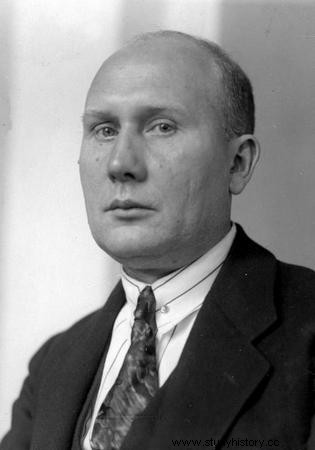
The whole thing started with the accusation made by the socialist MP Jan Kwapiński ...
There was nothing I could do
As is the case in many contemporary cases, a medic practicing in Kalisz, accused of such shameful conduct, decided to pursue his rights in a courtroom. Brought against the socialist parliamentarian and editor-in-chief of Robotnik, Stanisław Dubois, a defamation suit . Ultimately, after numerous postponements, the case was brought to the list of the Warsaw District Court only in October 1931.
Rychliński, testifying as a witness, initially stated that the accusations against him were part of the whole series of plots of a group of socialists from Kalisz who wanted to deprive him of the position of the chief physician of the local hospital, which, as he pointed out, finally succeeded. He also emphasized that as a result of them: today I am morally and materially ruined . While discussing his attitude during his office as a prison doctor in Orel, which he had held from 1908, he stated - as reported by Dziennik Łódzki - that:
these allegations are completely unfounded as they had no influence on the prison administration's behavior. The conditions were harsh, the prisoners were shackled in handcuffs, from which they were not released often during illness, because it was not even within the competence of the governor but depended on the governor.
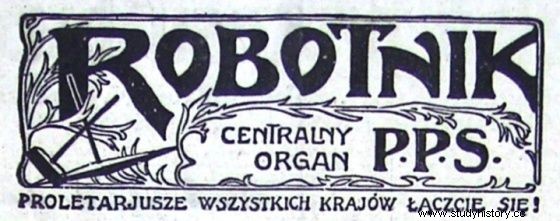
... who in the pages of "Robotnik" stated that Dr. Bronisław Rychliński denied Polishness and helped the tsarist apparatus of repression to persecute prisoners.
He himself reportedly never had contact with prisoners in private and he did not know which of them were Poles.
Jan Kwapiński remembered the case quite differently, serving from 1907 - mainly in Orel - a sentence of 15 years of hard labor for his activity in the PPS Combat Organization of the Revolutionary Faction.
As S. Milewski writes in his book "Ciemne Sprawy interwar", the former MP testified that when he turned to the doctor once, informing him in a whisper that he was a Pole, he heard in reply:"Małczat ', gawarit' after Ruski ” . Moreover, Kwapiński maintained that Rychliński had enormous power and that all convicts had to take off their hats when they saw him.
Convictions remember it differently
The version of the socialist politician was also confirmed by other ex-prisoners called as witnesses who had the misfortune of ending up in the Eagle. They indicated, for example, that the doctor:
assisted in whipping 600 prisoners , with his certificates, he covered the deaths of prisoners who ended either by suicide or died under the whip, tortured to death.
This article has more than one page. Please select another one below to continue reading.Attention! You are not on the first page of the article. If you want to read from the beginning click here.
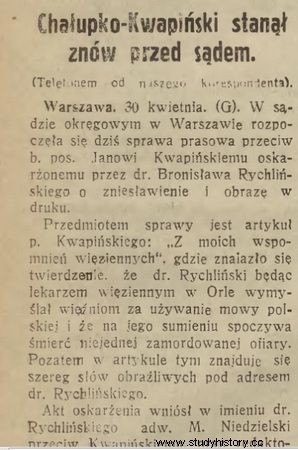
The lawsuit against Kwapiński was reported in newspapers all over Poland. This was also written about by the Lviv "Polish Word" in the issue of May 2, 1931.
As reported by Dziennik Łódzki, the defense attorney of Jan Kwapiński - to prove that his client did not deviate from the truth about the attitude of Dr. Izvestia. The newspaper wrote:
During the trial, Dr. Rychliński pleaded guilty to rude conduct, negligence and disregard, and the mistreatment of political prisoners.
He asked for a lenient sentence, citing his 6-year service in Bolshevik institutions .
Sentenced to 5 years
Ultimately, however, he did not serve the sentence, because he was exchanged in 1924 for a communist arrested in Poland.
Of course, one should be careful with the trials in the USSR. Moreover, the court did not accept the article as evidence, arguing that the court reports in the press were not documents. At the same time, as noted by Dziennik Łódzki, the defense's conclusion cast a characteristic and strong reflex.
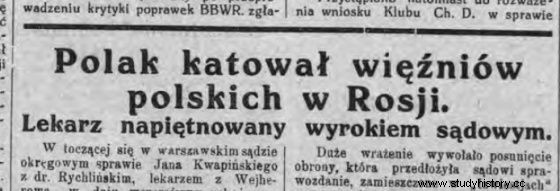
Excerpt from an article from "Dziennik Łódzki" from October 21, 1931.
After a two-day trial, on October 20, 1931, they acquitted both of the defendants, finding that the testimony of witnesses was evidence of the truth against Dr. Rychliński of the charges.
Lustration? It doesn't change
The whole matter was very aptly summed up by the correspondent of the Warsaw "Rzeczpospolita" quoted in S. Milewski's book:
Dr. Rychliński is a shadow of a gloomy past , and there are a lot of people like him in Poland. Many of them may even enjoy the respect of their fellow citizens, unaware of who they are dealing with.
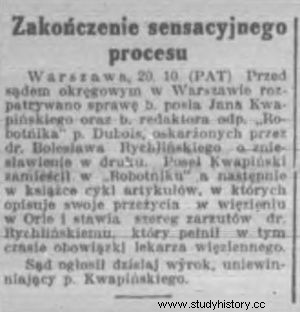
"Kurier Poznański" informs about the process.
Later in the article, the journalist asked a question that seems quite relevant today:
But for what former Russian actors are honored […] , who in Russia were ashamed of their Polish origin, and sometimes even hostile to their compatriots. They remembered about Poland when Russia did not happen.
Has little changed over the course of several decades? Perhaps only that our great-grandparents struggled with the tsarist past. We - with a communist past.
